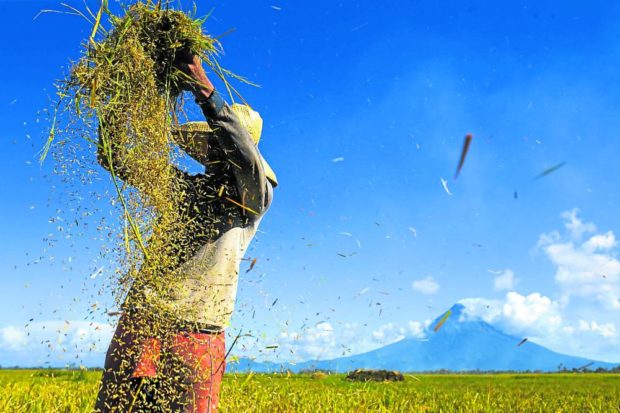Set aside Maharlika profits for agri sector, gov’t urged

A rice farmer in Tiwi, Albay, collects leftover grain under the heat of the sun after putting it on a rice-threshing machine, a task known in Bicol as “paghinimuro” in this photo taken on April 22, 2020. —MARK ALVIC ESPLANA/FILE PHOTO
MANILA, Philippines — The Philippine Chamber of Agriculture and Food has urged the government to specifically allocate a portion of the earnings from the sovereign Maharlika Investment Fund (MIF) to the country’s agriculture sector, particularly for projects aimed at improving the food value chain.
Danilo Fausto, chamber president, said “any activity, investment or investible fund from the Maharlika Investment Fund should go to agriculture [about] 25 to 30 percent.”He noted that state-run Land Bank of the Philippines and Development Bank of the Philippines have been identified as fund sources for the proposed sovereign wealth fund.
“These are our agricultural banks. I do not see in the Maharlika Investment Fund anything on the agricultural sector. I want to make it mandatory in the law that a portion of that fund should be invested in agricultural value chain,” Fausto said.
Fausto pointed out that proceeds from the MIF should be invested in building various facilities, such as cold storage, warehousing, processing, milling, drying and silos, which can likewise generate revenues for the government upon completion.
He said agriculture sector businesses pay P7 per kilo, or around P70,000 per room, to store onions in cold storage facilities under six-month contracts.
Fausto explained that in a typical shipment of 60,000 metric tons of onions, there will be a need for 6,000 cold storage rooms since each room can store about 10 metric tons.
“We do not define agriculture as per production but it should involve the entire value process, value chain. We need storage facilities, we need logistics. That’s what we need and that will make money,” Fausto said, suggesting that these facilities be operated by private sector cooperatives and not the government.
Fausto likewise proposed establishing a food terminal in every region for processing and distributing agricultural goods nationwide.
Legislation on the proposed sovereign fund, docketed as House Bill No. 6608, hurdled the House of Representatives’ second and third readings on Thursday and is now pending at the Senate.
Although he and six other representatives were defeated in opposing the sovereign fund, opposition leader and Albay Rep. Edcel Lagman reiterated that the government should act promptly on poverty and inflation as citizens may die even before enjoying the benefits of the proposed Maharlika Investment Fund.
“We must bail out our people now from poverty, inflation, and the dire challenges of recession, rather than investing in long-term ventures while our people may perish ahead without enjoying the promised fruits of Maharlika,” the Liberal Party president said in a statement on Saturday.
He pointed out that “no avalanche of accepted amendments can cure the inherent chronic and substantial defects of the Maharlika Investment Fund.”
“Amendments can cosmeticize Maharlika but cannot make it seasonable in the face of negative and ominous economic indicators, which deter its creation,” he said.